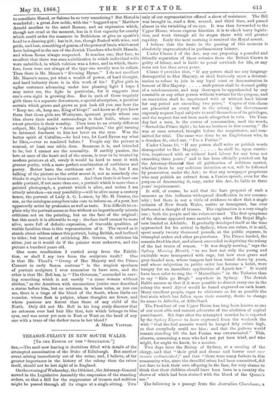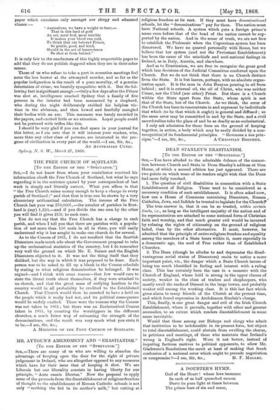TREASON-FELONY IN NEW SOUTH WALES. [To TILE EDITOR OF THE
"SPECTATOR."] SIR,—The mail now leaving is doubtless filled with details of the attempted assassination of the Duke of Edinburgh. But another event arising immediately out of the crime, and, I believe, of far greater importance in the history of the colony than the crime itself, should not be lost sight of in England.
Onthe evening of Wednesday, the 18th inst. , the Attorney-General moved in the Legislative Assembly the suspension of the standing orders, so that a Bill for the suppression of treason and sedition might be passed through all its stages at a single sitting. Two only of our representatives offered a show of resistance. The Bill was brought in, read a first, second, and third time, and passed almost in the twinkling of an eye. It was then forwarded to the Upper House, whose express function it is to check hasty legisla- tion, and went through all its stages there with still greater rapidity. Early the next morning it received the Royal assent.
I believe that the haste in the passing of this measure is absolutely unprecedented in parliamentary history.
Under Clause 2 of the Act, any one proposing a peaceful and friendly separation of these colonies from the British Crown is guilty of felony, and is liable to penal servitude for life, or any term not less than seven years.
Clause 9 provides that, "If any person shall use any language disrespectful to Her Majesty, or shall factiously avow a determi- nation to refuse to join in any loyal toast or demonstration in honour of Her Majesty such person shall be deemed guilty of a misdemeanour, and may thereupon be apprehended by any constable or any other person without warrant for the purpose, and on conviction shall be imprisoned with or without hard labour for any period not exceeding two years." Copies of this clause are placarded ou every wall in the colony ; the Government expressly request loyal subjects to avail themselves of its privileges, and the request has not been made altogether in vain. On Tues- day last a man, in the course of conversation, used the words, " gerved the Prince right ; he has no business in this country." He was at once arrested, brought before the magistrates, and com- mitted for trial. The same was done to an Englishman who, in a drunken fit, cried out, " I'm a Fenian !"
Under Clause 10, "If any person shall write or publish words
disrespectful to Her Majesty he shall be, upon convic- tion, imprisoned with or without hard labour for any term not exceeding three years ;" and it has been officially pointed out by the Attorney-General that all publication of seditious matter, whether there be any seditious intention or nat, will be followed by prosecution under the Act ; so that any newspaper proprietor who may publish an extract from a Fenian speech, even for the purpose of denouncing it, may, under this Act, be liable to three years' imprisonment.
It will, of course, be said that the bare proposal of such a measure as this indicates widespread disaffection in our commu- nity ; but there is not a tittle of evidence to show that a single colonist of New South Wales, native or immigrant, has ever harboured a thought of treason. The explanation is a very simple
one ; both the people and the rulers are mad. The first symptoms of the disease appeared some months ago, when His Royal High- ness landed at Adelaide. It gradually developed itself as the time approached for his arrival in Sydney, when our rulers, it is said, spent nearly twenty thousand pounds, at the public expense, in triumphal arches and other preparations. The Prince landed, the assassin fired his shot, and almost succeeded in depriving the colony of the last traces of reason. " It was deeply moving," says the
Sydney Morning Herald, "to see how not only the young and excitable were transported with rage, but how even grave and grey-headed men, whose tempers had been toned down by years,
and whose subjection to public order has become a habit, were hungry for an immediate application of Lynch law." It would have been safer to sing the " Marseillaise " in the Tuileries than to say " Erin go Bragh " anywhere in Sydney. The Jewish
Rabbi assures us that if it were possible to dissect every one in the colony the word Alfred would be found engraved on each heart.
Many excellent people, eager to obliterate as far as possible the foul stain which has fallen upon their country, desire to change its name to Alfredia, or Alfredland.
The President of our Upper House has long been known as one of our most able and earnest advocates of the abolition of capital punishment. Six days after the attempted murder he is reported by the Sydney Express to have expressed from the woolsack the wish "that the foul assassin would be hanged fifty cubits high,
so that everybody could see him ; and that the gallows would remain standing till the last Fenian was exterminated." This, observe, concerning a man who had not yet been tried, and who might, for aught we know, be a maniac.
Two days later the Bishop of Sydney, at a meeting of the clergy, said that " their grief and shame and horror must ever remain undiminished;" and that "there were many fathers in this community who, since the dreadful crime had been committed, did not dare to look their own offspring in the face, for very shame to think that their children should have been born in a country the shores of which had been stained with the blood of the Queen's son."
The following is a passage from the Australian Churchman, a
paper which circulates only amongst our clergy and educated classes :—
"Australians, we have a weight to bear,—
That in this land of gold An act, most foul, most terrible It makes your blood run cold, To think that our beloved Prince, So gentle, good, and kind, Should in the act of benevolence Be shot at from behind."
It is only fair to the conductors of this highly respectable paper to add that they do not publish doggerel when they are in their sober senses.
Those of us who refuse to take a part in sensation meetings feel none the less horror at the attempted murder, and so far as the popular indignation is the result of a pure morality, of a genuine detestation of crime, we heartily sympathize with it. But the fol- lowing fact is significant enough :—Only a few days after the Prince was shot at, intelligence reached Sydney that a family of five persons in the interior bad been massacred by a shepherd, who during the night deliberately stabbed his helpless vic- tims in the abdomen, and then hewed and fearfully mangled their bodies with an axe. This massacre was barely recorded in the papers, and excited little or no attention. Loyal people could not be pestered with trifles like this.
I should be very glad if you can find space in your journal for this letter, as I am sure that it will interest your readers, who, more than any other class of persons, are interested in the pro- gress of civilization in every part of the world.—I am, Sir, &c., Sydney, N. S. W., March 27, 1868.
AN AUSTRALIAN CYNIC.



































 Previous page
Previous page